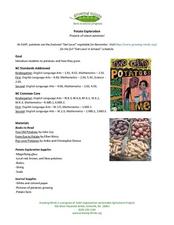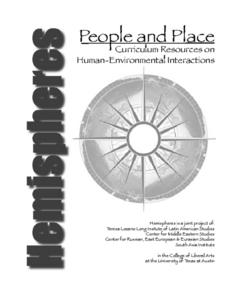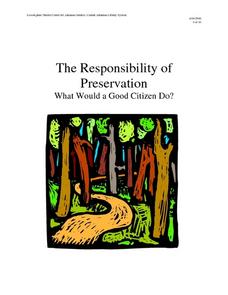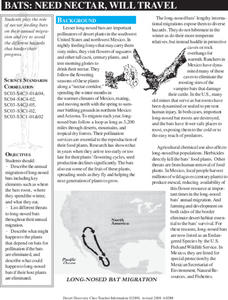Growing Minds
Potato Exploration: Projects All About Potatoes!
How many potatoes tall are you? Unearth this rich resource! A reading of John Coy’s Two Old Potatoes begins a cross-curricular exploration of potatoes. Class members read, write, weigh, measure, and experiment with potatoes. Additional...
Curated OER
Water: From Neglect to Respect
The goal of this collection of lessons is to make middle schoolers more aware of the ways in which they are dependent upon water to maintain their standard of living. Learners compare water use in Lesotho to water use in the United...
Curated OER
Civil Rights in America
Seventh graders visit the Smithsonian and are shown different exhibits. They are to make their own drawing about one of the exhibits and write about the experience.
Curated OER
Big Dam Construction in India
This complete and full resource includes everything needed to conduct a lesson on the environmental impact of large dams in India. Background information, handouts, answer keys, and web links are all there to help you educate your class...
Curated OER
The Responsibility of Preservation
Upper elementary and middle schoolers study the case of the ivory-billed woodpecker, a bird that was once-thought to be extinct. Learners explore the responsibility of people to preserve habitats, and take care of the animals who live in...
Oklahoma Ag in The Classroom
Bee Smart Bee Happy
Here is a wonderfully designed lesson on bees and pollination designed for early elementary learners. After a class discussion on bees, pupils pretend to be a bee by picking up nectar off of "flowers" in the class. The flowers are...
Curated OER
India: Is Terrorism Hurting the Economy?
Students investigate the effect of terrorism on the Indian economy. They conduct research on terrorist activity in India, create a timeline, and participate in a summit between Indian and Pakistan.
Curated OER
Water Works
Learners create a "water web" to illustrate the interdependence among water users and producers. They distinguish between direct and indirect uses of water; illustrate the interconnectedness of water users in a community; and demonstrate...
Curated OER
China's Three Gorges Dam
A very well-done resource includes an informational reading passage describing the controversy and impact of China's Three Gorges Dam. It also includes eight guided reading questions, a pros/cons arguments chart, and a creative writing...
Curated OER
Fortified Breakfast
Students reverse engineer a cereal. In this dietary lesson students identify the minerals that the human body needs to function. Students examine how foods are fortified by food engineers. Students find the amount of iron in a cereal by...
Curated OER
Harvesting Mosaics
Students use pieces of farm pictures to investigate the elements of art. In this farm art lesson, students use pieces of pictures to create an original artwork. Students use the Internet to find images. Students create a...
Curated OER
The Peanut Wizard
Students read and discuss information regarding George Washington Carver and how the peanut became cultivated in the southern colonies of the United States. In this George Washington Carver lesson plan, students develop vocabulary that...
Curated OER
Native Americans of the Chesapeake Bay: Using Primary vs. Secondary Sources
Discover the rich Native American culture that existed at the time of early European exploration into the Chesapeake region through analysis of several primary and secondary sources.
US Department of Agriculture
Serving Up My Plate
Offer your youngsters an extra helping of nutritional knowledge and healthy tips with this resource, which centers around the MyPlate nutritional guide and offers three "courses" of plans and worksheets on the food groups and the...
Agriculture’s Lasting Heritage
Apples Around Us
Apple tasting launches an investigation of the story and travels of John Chapman, also known as Johnny Appleseed. After listening to his story, class members craft a summary of the tale, chart his journeys on a map, and sample different...
Teach Engineering
Introduction to Water Chemistry
What are the issues surrounding water quality? Viewers of this short presentation gain information about the importance of clean water, the lack of fresh water, water contamination, and ways that engineers treat water.
Roy Rosenzweig Center for History and New Media
Differences Among Colonial Regions
Classes look at and analyze primary source images to explore the differences between the colonial regions during the Revolutionary era. They break into groups to tackle each region and then present their findings to the class. A final...
Kenan Fellows
Sustainability: Learning for a Lifetime – Soil
Do great gardeners really have green thumbs—or just really great soil? Environmental scholars discover what makes Earth's soil and soil quality so important through research and experimentation. Learners also develop an understanding of...
Smithsonian Institution
Mobilizing Children
Scholars find out how the government used propaganda to mobilize children to help in the war effort. Lesson exercises include analyzing a quote from Franklin Roosevelt, viewing propaganda images and posters, and participating in a lively...
Foreign Policy Association
U.S. and Europe Online Lesson Plan
Class groups investigate the economic and political implications of a country's policies on genetically modified foods, craft a position paper detailing that policy, and share their findings with the class. Armed with this...
Desert Discoveries
Keepers of the Prairie
Young ecologists examine the case of the prairie dog, and their near extinction. They read a terrific student handout embedded in the plan, and engage in a class discussion that's based on what they read. Learners perform research on...
Curated OER
Bats: Need Nectar, Will Travel
Beginning wildlife biologists become adult bats, baby bats, snakes, owls, bobcats, or land-clearing developers in a grand role-playing activity. In a large open space, they play a game in which they move to designated areas based on what...
Curated OER
The Risks of Everyday Living
Students compare their perceptions of risk to the perceptions of scientists and risk professionals. in small groups, they evaluate risks on a scale of 1 to 10 for the average American on a yearly basis.
Curated OER
Honey Bees and Communication
Did you know that honey bees dance to communicate information? Do you know why bees use hexagons to build their hives? The Honeybee Man, Brilliant Bees, and Show me the Honey provide background information on how honey bees communicate....
Other popular searches
- Sustainable Agriculture
- Farms and Agriculture
- Agriculture News
- Agriculture and Environment
- Agriculture Organizations
- Careers in Agriculture
- Agriculture Education
- Agriculture Work Sheets
- Colonial Agriculture
- Agriculture in Canada
- Agriculture in California
- Agriculture Biotechnology























